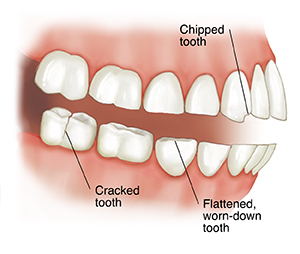A
B
C
D
E
F
G
H
I
J
K
L
M
N
O
P
Q
R
S
T
U
V
W
X
Y
Z
Click a letter to see a list of conditions beginning with that letter.
Click 'Topic Index' to return to the index for the current topic.
Click 'Library Index' to return to the listing of all topics.
Understanding Teeth Grinding (Bruxism)
Teeth grinding (bruxism) may happen at any time. People often grind their teeth while sleeping and may not even be aware of it. Stress is one possible cause. But the cause isn't always known.
Damage caused by teeth grinding
Teeth grinding may cause:
-
Chipped enamel and cracked teeth
-
Flattened, grooved, worn-down teeth
-
Loosened teeth
-
More rapid progression of gum (periodontal) problems
If it goes untreated, bruxism may lead to jaw muscle and joint problems. These are known as TMJ (temporomandibular joint) problems or TMD (temporomandibular disorder). You could even lose your teeth.

Evaluating the problem
Your dentist will examine your entire mouth and ask several questions. Your dentist will check for worn teeth and enamel. This evaluation helps confirm that you do grind your teeth. It may also help find a possible cause of your teeth-grinding habit.
The symptoms of grinding
Symptoms like these may be a signal that you grind your teeth:
-
A sore, tired jaw
-
Sensitive teeth
-
Loose teeth
-
Dull headaches, earaches, or neck aches
-
Clicking sounds when you open your mouth
Treatments
Your dentist may suggest one or more of these treatments:
-
Amouth guard. This is a plastic device that fits over your teeth. It protects teeth from grinding damage. It's worn at the times when you're most likely to grind your teeth.
-
Bite adjustment. This involves fixing the way your top teeth fit against your bottom teeth. It can reduce the chances of grinding if your bite is uneven.
-
Reducing stress. This may reduce grinding by relaxing your jaw muscles. Your dentist may advise ways to reduce stress, such as exercise, counseling, or meditation.
-
Medicine. The dentist may prescribe a muscle relaxant to take before bedtime. This can help ease sore muscles.
Online Medical Reviewer:
Jessica Gotwals RN BSN MPH
Online Medical Reviewer:
Michael Kapner MD
Online Medical Reviewer:
Rita Sather RN
Date Last Reviewed:
8/1/2022
© 2000-2024 The StayWell Company, LLC. All rights reserved. This information is not intended as a substitute for professional medical care. Always follow your healthcare professional's instructions.